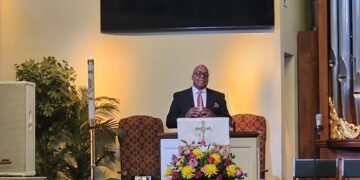Republicans say they’ll have to adapt to any potential federal funding cuts
Courtesy of Kentucky Lantern
LEXINGTON — Republican leaders in the Kentucky legislature during a Monday conference forewarned of challenges to crafting a state budget next year, particularly with potential funding cuts and extra costs shifted to state governments for health care and food assistance.
A slew of state lawmakers shared their perspectives on the next state budget and other topics ranging from energy policy to transportation at the Kentucky Chamber of Commerce’s conference that served as a preview of the upcoming legislative session in 2026.
Lawmakers will meet at the start of next year to craft a two-year state budget consisting of more than $100 billion that funds local school districts, state agencies and covers a portion of costs for federal programs including Medicaid, which provides health care to low-income people and other qualifying recipients.
State governments including Kentucky will also have to grapple with significant costs shifted to them by Congress for large federal assistance programs—namely Medicaid and the Supplemental Nutrition Assistance Program, or SNAP—through the passage of the One Big Beautiful Bill Act this summer.
“It will impact the way we do the budget,” said Kentucky House Speaker David Osborne, R-Prospect, speaking before the crowd of business interests. “I think this budget is going to present some unique challenges because there really are disparate ideas on how we approach this budget.”
The One Big Beautiful Bill Act shifted more administration costs to states for the Supplemental Nutrition Assistance Program, or SNAP, which provides nearly 593,000 low-income Kentuckians with funding to buy food. The One Big Beautiful Bill Act also changed how much cost-share states cover for SNAP depending on how often a state makes an error in determining SNAP benefits for a recipient.
Sen. Chris McDaniel, R-Ryland Heights, the chair of the Kentucky Senate Appropriations and Revenue Committee, told the crowd the increased SNAP costs would amount to an immediate $180 million “hit” to the state budget, also mentioning there would be “additional things” to address related to Medicaid in the future.
The Congressional Budget Office projected the One Big Beautiful Bill Act would reduce federal spending on Medicaid over a decade by $911 billion and increase the number of uninsured people by about 10 million. The National Conference of State Legislatures wrote that the decreased Medicaid spending is largely attributed to stricter eligibility for Medicaid—such as adding work requirements—and limiting the use of provider taxes that states use to cover their share of Medicaid costs.
But McDaniel was clear the state legislature wouldn’t be a backstop for programs “negatively impacted” by the One Big Beautiful Bill Act.
“Rethink your strategy,” McDaniel said. “The state is not going to backfill federal programs that get changed. It’s just not going to happen. We simply do not have the bandwidth or the financial wherewithal to do so.”
Rep. James Tipton, R-Taylorsville, the chair of the Kentucky House Postsecondary Education Committee, said during the conference the legislature had to be ready “if change does come” in regards to education funding. Federal education budget proposals from the White House and U.S. House Republicans call for deep cuts to funding for the nation’s K-12 schools.
One lawmaker also brought up looming financial questions facing Kentucky hospitals with the passage of the One Big Beautiful Bill Act, particularly the law limiting state taxes on health care providers that hospitals rely on to get better reimbursement rates for treating Medicaid patients.
Sen. Stephen Meredith, R-Leitchfield, the chair of the Senate Health Services Committee, mentioned to the crowd an assessment from the Kentucky Hospital Association that 35 hospitals in the state could close with the planned scale-down of provider taxes that hospitals rely on. Meredith told the Lantern he believed Congress would ultimately make changes to the One Big Beautiful Bill Act.
“I think our congressmen and women will say, ‘We’ve got to put a stop to this or make some adjustments,’” said Meredith, a former hospital CEO. “We can’t let 35 hospitals close. So something will happen.”
State funding uncertainty
State lawmakers during the one-day conference also alluded to facing a tighter budget in the next year as a result of uncertainty in state revenue in part triggered by federal trade policy under President Donald Trump’s administration.
The Consensus Forecasting Group, a group of economists charged with creating state government revenue forecasts, during its last meeting in September projected state revenues would fall over $300 million short of what is budgeted for the new fiscal year that began in July. That projected shortfall amounted to about a 2% decrease of the more than $15 billion budget for the fiscal year. The chairman of the forecasting group cited uncertainty with tariffs and trade for the revised revenue projection, though Democratic Gov. Andy Beshear also noted the decreases in income tax revenue.
The group will meet again in December to revisit its revenue projection for the current fiscal year and also project revenue for the upcoming two-year state budget to be considered by the legislature in 2026.
A significant question facing lawmakers regarding state revenues is what to do with the state’s income tax rate, something that the Kentucky Chamber of Commerce and GOP leadership want to eventually eliminate.
Osborne said there are “disparate” ideas on how to approach the state’s income tax rate this year and how much to spend from the billions of dollars in the state’s “rainy day” fund.
The GOP-controlled legislature, through a landmark law passed in 2022, created a system of fiscal triggers related to state revenues and the state’s “rainy day” fund before it can lower the state’s income tax rate by a half percentage point.
It’s a shared goal of the Kentucky Chamber of Commerce and GOP legislators to eliminate the state’s income tax rate, though the state failed to meet the system’s fiscal triggers this year to lower the income tax rate by another half percentage point in 2027. Fiscal triggers were hit last year, allowing the state income tax rate to drop 3.5% at the start of next year. The legislature changed the fiscal trigger system in this year’s legislative session to allow lawmakers to potentially reduce the income tax rate by less than a half percentage point.
House Majority Floor Whip Jason Nemes, R-Louisville, argued on a panel with McDaniel that the legislature had actually met the fiscal triggers to reduce the income tax rate by another half percentage point in 2027. He asserted the timing was off for when revenue amounts were checked, arguing that not all state revenues had been accounted for.
Osborne said it was the state budget director’s opinion that the fiscal triggers were not met. But he also said “we can make policy however we want to make it.”
“There’s going to be conversations around this budget we haven’t had in the last several years that I think are going to be pretty interesting,” Osborne said. “Not necessarily disagreements or fights, but just different philosophies.”
Kentucky Lantern is part of States Newsroom, the nation’s largest state-focused nonprofit news organization.
























